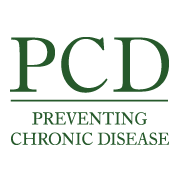PCD News Summary for January 26, 2017

About the Journal
Published every Thursday, Preventing Chronic Disease (PCD) is a peer-reviewed online journal established by CDC’s National Center for Chronic Disease Prevention and Health Promotion. The News Media Branch prepares press summary packets each week. To receive these press summaries on an embargoed basis, send an e-mail to media@cdc.gov. Please note that this e-mail list is for credentialed journalists only. All others, please visit Hookup to Health to sign up for e-mail updates
Notice to News Media – PCD Release Time and Embargo Policy:
CDC’s News Media Branch releases to reporters the PCD media packet every Tuesday afternoon between 12 and 2 pm.
Embargoed until Thursday, January 26, at 12:00 PM ET
Prevalence of Cancer Screening Among Adults With Disabilities, United States, 2013
Melissa Newton
mnewton@cdc.gov
404-718-6281
People with disabilities tend to get fewer cancer screenings than those without disabilities — a problem health care providers could help improve by discussing test importance with patients. Data from the 2013 National Health Interview Survey was used to assess prevalence of mammography, Pap tests, and endoscopy and stool tests; measure physicians’ recommendations for these tests; and assess the barriers to health care access among adults with and without disabilities. Researchers found a lower prevalence of breast and cervical cancer screening among women with disabilities. While people with disabilities were reported to have higher colorectal cancer screening rates than those without disabilities from 1998 to 2010, the rates reported in 2010 and in this study were found to be below the 70.5% Healthy People 2020 objective. Researchers note that their findings may be used to increase awareness about gaps in cancer screening among subgroups of this population, to help develop programs that educate people with disabilities about the importance of discussing preventive health services with their health care providers, and to remind providers about the critical roles they play in recommending use of these services.
Lessons Learned by Community Stakeholders in the Massachusetts Childhood Obesity Research Demonstration (MA-CORD) Project, 2013–2014
Melissa Newton
mnewton@cdc.gov
404-718-6281
Evaluation of a Massachusetts-based project aimed at preventing childhood obesity identified important successes and lessons learned that may benefit future obesity-prevention programs. The Massachusetts Childhood Obesity Research Demonstration project from 2012-2014 (funded by CDC) brought together stakeholders from multiple community sectors including preschools, schools, afterschool programs, the Special Supplemental Nutrition Program for Women, Infants, and Children (WIC) and primary health care clinics to implement evidence-based obesity prevention programs in two low-income communities in Massachusetts. Successes reported by interviewees included increased parental involvement in children’s health; increased connections within and across participating organizations; changes in organizational policies and environments; and improvements in health behaviors in children, parents, and stakeholders. Lessons learned included the importance of administrative and leadership support, involving stakeholders early in the planning process, and creating buffers that allow for unexpected changes.
###
Note: Not all articles published in PCD represent work done at CDC. In your stories, please clarify whether a study was conducted by CDC (“a CDC study”) or by another institution (“a study published by CDC”). The opinions expressed by authors contributing to PCD do not necessarily reflect the opinions of CDC or the institutions with which the authors are affiliated. PCD requests that, when possible, you include a live link to the article in your stories.
###
U.S. DEPARTMENT OF HEALTH AND HUMAN SERVICES
CDC works 24/7 protecting America’s health, safety and security. Whether diseases start at home or abroad, are curable or preventable, chronic or acute, stem from human error or deliberate attack, CDC is committed to respond to America’s most pressing health challenges.